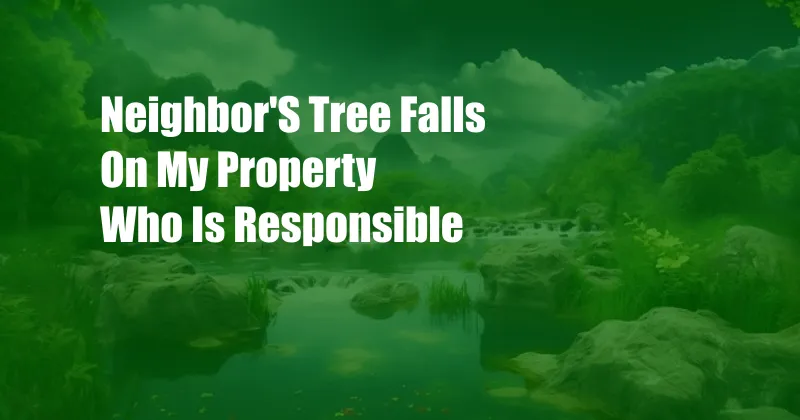
Neighbor’s Tree Falls on My Property: Who Is Responsible?
It was a dreary, stormy day when disaster struck, and a towering oak tree from my neighbor’s yard came crashing down on my property. The fallen giant shattered the fence, crushed my garden, and left a gaping hole in my roof. In the aftermath, I was left with a pile of debris, a hefty repair bill, and a burning question: who was responsible for this costly damage?
Navigating the legal labyrinth surrounding fallen trees can be complex. Determining liability often hinges on a myriad of factors, including the extent of damage, the age and health of the tree, and local ordinances. In this article, we will delve into the intricacies of this legal quandary and provide you with the knowledge to navigate this situation effectively.
Legal Framework for Fallen Tree Liability
Common Law Doctrine of Negligence
The common law doctrine of negligence typically governs disputes involving fallen trees. Negligence is defined as a failure to exercise reasonable care. In the case of fallen trees, the injured party must prove that the property owner owning the tree was negligent. This could mean they failed to adequately inspect and maintain the tree or ignored obvious signs of deterioration that could have led to its collapse.
Statutory Provisions
In some states, specific statutes govern liability for fallen trees. These statutes may impose strict liability on property owners, regardless of negligence. However, some states have “free fall” statutes protecting landowners from liability for trees that fall naturally during storms or other unforeseen circumstances.
Factors Determining Liability
To determine liability in a fallen tree case, courts consider several key factors:
- Ownership of the Tree: The property owner who owns the tree is generally responsible for its maintenance and upkeep.
- Age and Health of the Tree: If the tree was old or diseased, the owner may be liable for failing to inspect and remove it before it posed a risk.
- Cause of the Fall: If the tree fell due to a storm or other natural event, the owner may not be liable if they had no prior knowledge of any defects.
- Prior Complaints: If neighbors or tenants had previously complained about the condition of the tree, this could be evidence of negligence on the owner’s part.
- Local Ordinances: Local ordinances may impose additional requirements on property owners regarding tree maintenance and liability.
Tips and Expert Advice for Handling Fallen Tree Disputes
To protect yourself in the event of a fallen tree controversy, consider the following tips and expert advice:
- Document the Damage: Take photos and videos of the fallen tree and the damage it caused. Keep a record of all expenses incurred as a result of the incident.
- Contact Your Insurance Company: File a claim with your homeowners or renters insurance company promptly. They can help you assess the damage and cover repair costs.
- Negotiate with Your Neighbor: Try to resolve the issue amicably with your neighbor. If possible, reach a settlement that is fair to both parties.
- Consult an Attorney: If you cannot reach a settlement with your neighbor, consider consulting an attorney to protect your legal rights.
By understanding the legal framework and considering these tips, you can navigate disputes involving fallen trees more effectively.
FAQ on Fallen Tree Liability
- Q: Who is responsible for a fallen tree that damages my property?
A: The property owner who owns the tree is typically responsible, unless the fall was caused by an unforeseen natural event. - Q: What should I do if a neighbor’s tree falls on my property?
A: Document the damage, contact your insurance company, and attempt to resolve the issue amicably with your neighbor. - Q: Are there any defenses to fallen tree liability?
A: Yes, defenses include the tree falling due to a natural event or the injured party’s contributory negligence. - Q: What is the statute of limitations for filing a claim for fallen tree damage?
A: The statute of limitations varies by state, but it is typically one to three years. - Q: Can I get compensation for fallen tree damage?
A: Yes, you may be entitled to compensation for property damage, lost income, and other expenses.
Conclusion
Navigating the legal complexities of fallen tree liability can be challenging. By understanding the legal framework, considering the relevant factors, and following the tips provided in this article, you can better protect your rights and resolve fallen tree disputes effectively.
Have you ever encountered a situation where a neighbor’s tree fell on your property? Share your experience and insights in the comments below.